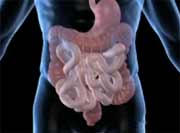- 8 Ways to Increase Dopamine Naturally
- 7 Best Breads for Maintaining Stable Blood Sugar
- Gelatin vs. Collagen: Which is Best for Skin, Nails, and Joints?
- The Long-Term Effects of Daily Turmeric Supplements on Liver Health
- Could Your Grocery Store Meat Be Causing Recurring UTIs?
- Are You Making This Expensive Thermostat Error This Winter?
- Recognizing the Signs of Hypothyroidism
- 10 Strategies to Overcome Insomnia
- Could Artificial Sweeteners Be Aging the Brain Faster?
- Techniques for Soothing Your Nervous System
1 in 3 Not Meeting Colon Cancer Screening Guidelines: CDC


TUESDAY, Nov. 5Detecting colon cancer early saves lives, yet only about two-thirds of Americans aged 50 to 75 have undergone screening, health officials said Tuesday.
Although the U.S. Preventive Services Task Force recommends that men and women 50 and older get screened, about 23 million Americans — or 28 percent of people who should be screened — have never done so, according to the U.S. Centers for Disease Control and Prevention (CDC).
Another 7 percent of people have undergone some screening but are not up-to-date, survey results showed.
“Despite research that shows colorectal cancer screening saves lives, screening rates remain far too low,” CDC director Dr. Tom Frieden said during a noon press briefing Tuesday.
“Colon cancer is the second-leading cancer killer for both men and women. In fact, it’s the leading killer of nonsmokers in this country, killing about 50,000 people a year,” he said.
The CDC report was published online Nov. 5 in the Morbidity and Mortality Weekly Report.
The number one reason people aren’t being screened is because their doctor didn’t recommend it, Frieden said.
Which is why the CDC is encouraging doctors and health care systems to reach out to people who should be screened and offer them the opportunity for testing, he added.
People should be asking their doctors about screening, he suggested. “It is also important that individuals learn about testing options and get the test that’s right for them,” Frieden said. “But we also know that not having health insurance greatly reduces the likelihood that someone will get tested and that’s why increasing coverage is another way of saving lives.”
Several screening options can be used alone or in combination, including the following:
- Fecal occult blood test or fecal immunochemical test — which can be done at home — every year.
- Flexible sigmoidoscopy, done every five years, with home fecal tests done every three years.
- Colonoscopy done every 10 years.
A colonoscopy can find precancerous polyps early so they can be removed before they turn into cancer, Frieden said. Fecal blood tests are simple at-home tests that can find cancer early by identifying blood in the stool, which might be a sign of cancer, he said.
All these tests are effective and one is not necessarily better than another, Frieden added. “The best test is the one that gets done,” he said.
For some people, however, colonoscopy may be the best option, Frieden said. These are people with a strong family history of colon cancer or an intestinal condition such as inflammatory bowel disease, or people who have had polyps removed in the past.
“But for everyone else, and that’s the majority of people, there is no proven benefit to one versus another,” Frieden said. Of course if blood is found after a fecal blood test, then a colonoscopy is needed, he explained.
Other findings in the report include:
- Most people who are screened (62 percent) have a colonoscopy.
- Only 10 percent have a yearly fecal blood test.
- Less than 1 percent are screened with a combination of flexible sigmoidoscopy and fecal blood tests.
- Massachusetts had the highest percentage of people up-to-date in their screening (76 percent).
- Compared to other states, California had twice the percentage of adults screened with fecal blood tests (20 percent).
- Screening was similar among blacks and whites, but more blacks used fecal blood tests than whites.
The report is based on data from the 2012 Behavioral Risk Factor Surveillance System, a yearly state-based telephone survey.
More information
To learn more about colon cancer, visit the American Cancer Society.
Source: HealthDay
Copyright © 2026 HealthDay. All rights reserved.










